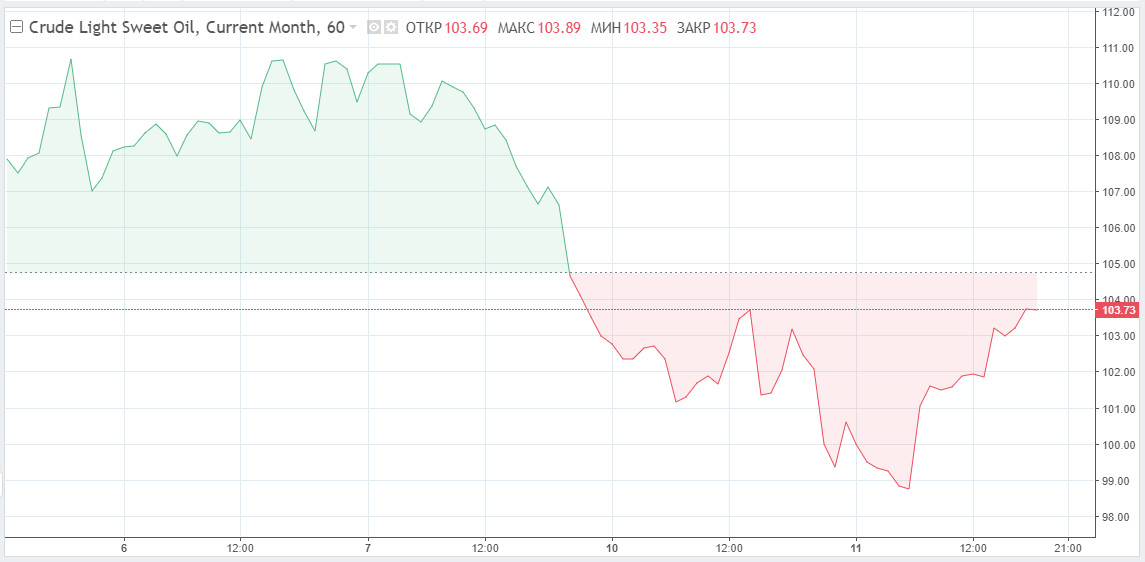
Oil prices rebound on Wednesday morning, gaining more than 2.5% from yesterday's fall. The price of July futures for Brent crude by the time the material was prepared rose by 3.65% to $106.20 per barrel. The price of June futures for WTI by this time increased by 3.90% to $103.73.
The rise in value occurs as part of a correction after the decline in quotes by almost 8% over the previous two trading days. The reason for the decline was reports that the US Department of Energy has lowered its forecast for global oil demand in 2022 and 2023. The fact that China is experiencing an outbreak of coronavirus again, preventing a steady increase in consumption, also plays an important role.
The fall in oil contracts was also caused by the rising dollar. A more expensive US currency traditionally makes it more expensive to buy oil for those traders who use other currencies.
The dollar index is declining during the European session, but is still trading near the high over the past 20 years. The market in anticipation awaits the release of key data on inflation, from which the US Federal Reserve will be based in the adoption of further policy. Recall that last week the Fed raised the base interest rate by 50 basis points. After that, US officials hinted that such steps would be taken again at the upcoming meetings, although perhaps not as significant.
The energy market is in the dark about the future supply of Russian oil and gas volumes to the world market. According to ING analysts, this uncertainty about the supply from the Russian Federation remains worrisome and high potential for price growth.
It is obvious to everyone that the EU is clearly incapable of unanimously agreeing on a plan to impose an embargo on Russian oil supplies. It is no longer a secret to anyone that the confident statements of European Commission officials turned out to be hasty. European political elites may well soften the announced latest package of sanctions against Russia, since many EU member states cannot yet join its main points.
For example, Hungary today does not have the opportunity to fully support its fellow members of the union, since in fact it cannot so quickly abandon Russian energy resources. According to Western media reports, the ambitious and irreconcilable European Union even almost agrees that Hungary (as well as a number of other Eastern European countries, by the way) refuses to purchase Russian oil not by the end of this year, but at best by 2024. However, some EU officials still offer not to delay, and if Hungary cannot take risks, then to provide it with compensation in exchange for supporting the embargo and full acceptance of sanctions against the Russian Federation.
It is obvious that the EU is trying with all its might to remove Russia from the European energy market, even to the detriment of many of its interests. If Hungary nevertheless decides to support the decision of its Western European partners, bringing its economy into a clear decline, this will give an additional incentive for oil quotes to creep up. But here, not everything is so smooth. First, there is a high probability of an imminent nuclear deal with Iran. And secondly, negotiations between the United States and Venezuela actively ensure that more Venezuelan oil enters world markets.
Against the background of the desire of the political elites of the European Union to rally their countries in the fight against Russia, notes of distrust towards their German neighbors are already ripening in the political circles of Poland. Polish government spokesman Piotr Muller unexpectedly announced that he suspects that Germany will start reselling Russian oil to Poland. Recall that before that, the Polish authorities reported that they would completely abandon the import of Russian energy carriers by the end of 2022. However, to avoid misunderstandings, Poland is proposing a pan-European embargo on fuel from Russia or a special tax on all energy products imported from Russia. According to spokesman Muller, this approach will help balance the current market situation.
According to the American Petroleum Institute (API), US commercial oil inventories increased by 1.618 million barrels last week (May 2-6). Experts predicted a decrease in stocks of raw materials by 0.457 million.

 English
English 
 Русский
Русский Bahasa Indonesia
Bahasa Indonesia Bahasa Malay
Bahasa Malay ไทย
ไทย Español
Español Deutsch
Deutsch Български
Български Français
Français Tiếng Việt
Tiếng Việt 中文
中文 বাংলা
বাংলা हिन्दी
हिन्दी Čeština
Čeština Українська
Українська Română
Română

